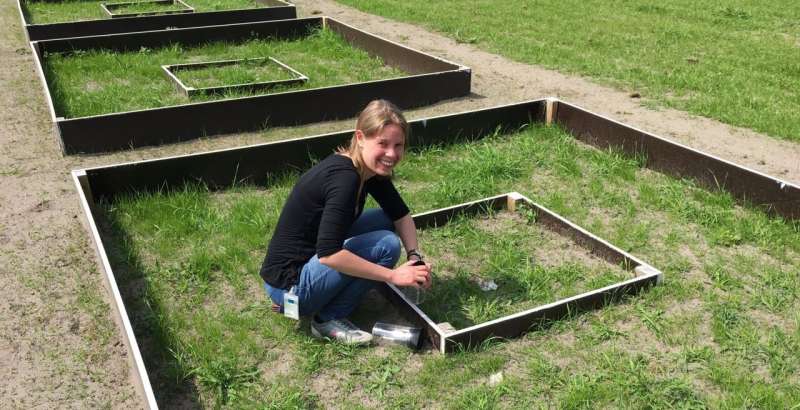Worms elevate phosphate levels in grass

Worms are the farmer's main little helpers. They improve soil structure and help the plant obtain nutrients and phosphate. But some worms do a better job than others. Hannah Vos obtained her Ph.D. on research on which worms are better at providing this service. And on the fly, she also discovered why this works so well in ferrous soils.
Vos focused on worms that are vital to grasslands. In an extensive field experiment, two of the five worms she studied (Aporrectodea longa and Lumbricus terrestria) appeared the most proficient in delivering the available (inanimate) phosphate to the plant. These two worms alone increased the phosphate levels in the grass by as much as twenty percent in some cases.
Field experiment
But the diversification in the results was considerable, says Vos. This can, however, be explained by the fact that the field experiment was impacted by the dry summers of 2018 and 2019. "And, added to that, there was an ant plague. There was an ant nest in nine out of my ninety testing pots. The ants attack the worms, which means there was quite some variation in my results."
Phosphate in the soil can be made available to the plants through mineralization. Worms transform phosphates in organic compounds into minerals. The greater part of this inanimate phosphate is included in soil particles. Only a tiny fraction is directly available for the plants.
"In my field experiment, I used a single type of soil, which was not a type dominated by iron-oxides," says Vos.
Vos discovered why worms in ferrous soils are better able to make phosphates available for the plant. The metal oxides in the soil increase to larger particles in the worm's stomach. This reduces the total surface of metal oxides and, with it, the options to bond the phosphate. The phosphate is thus released in suspension.
The newly discovered mechanism only works in ferrous soils. Calculations in models show that the effect is considerably greater than, for example, the effect of soil acidity or the presence of organic substances in the soil and comparable to the worms' capacity to mineralize organic phosphate.
Mineralization
How significant the "Vos-effect" is under field conditions is yet to be determined. "In my field experiment, I used a single type of soil, which was not a type dominated by iron-oxides." The fact that two worm species still managed to release more phosphate is because these worms have a greater capacity to mineralize organic phosphate, says Vos.
Earthworms cannot simply replace (artificial) fertilizers. "But my research shows that certain worms have potential in certain soils," Vos says. "They are essential for the availability of phosphates, and we must take good care of these little creatures."
Provided by Wageningen University




















